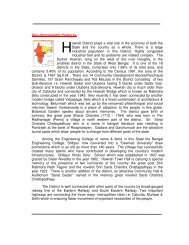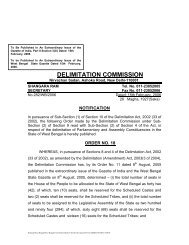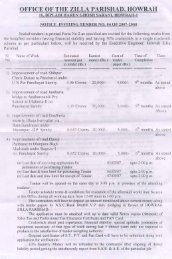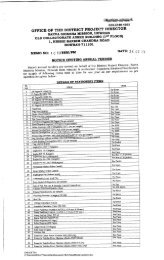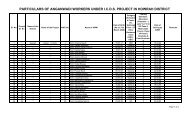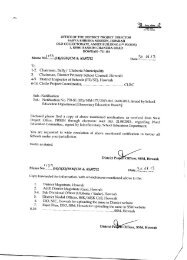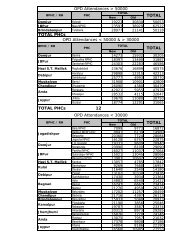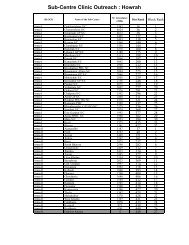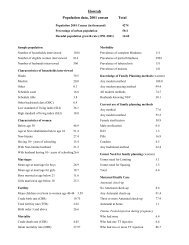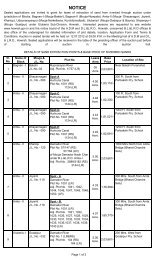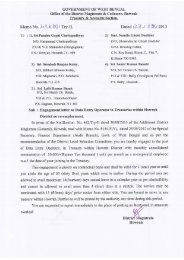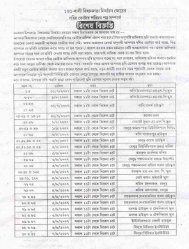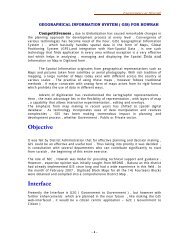SARVA SHIKSHA MISSION
SARVA SHIKSHA MISSION
SARVA SHIKSHA MISSION
You also want an ePaper? Increase the reach of your titles
YUMPU automatically turns print PDFs into web optimized ePapers that Google loves.
<strong>SARVA</strong> <strong>SHIKSHA</strong> <strong>MISSION</strong><br />
OBJECTIVES OF SSM<br />
All children to be enrolled in school by 2003<br />
All children to complete four years of primary schooling (class I to IV) by 2006<br />
All children to complete eight years of school (class I to VIII) by 2010<br />
Focus on elementary education of satisfactory quality<br />
Universal retention of all children up to the age of 14 years by 2010<br />
Organizational set up of SSM at the District Level<br />
‣ DISTRICT S.S.M COMMITTEE – The Policy Making Setup<br />
1. Sabhadhipati – Chairman<br />
2. District Magistrate – Executive Vice-Chairman<br />
3. Chairman,DPSC – Vice-Chairman<br />
4. Karmadhyaksha, Siksha Sthayee Samit, HZP - Vice-Chairman<br />
5. DI of Schools (PE) –Member<br />
6. DI of Schools (SE) – Member<br />
7. DNO,SSK – Member<br />
8. DPO,SSM– Member-Secretary<br />
9. Dist. Programme Officer – Member<br />
10. Dist. Mass Education Officer – Member<br />
Other nominated Members<br />
‣ EXECUTIVE SETUP<br />
District Project Director - District Magistrate<br />
District Project Officer Deputy Magistrate<br />
2 Additional District Project Officers A.I of Schools<br />
2 Deputy District Project Officers S.I of Schools<br />
8 nos of Coordinators, 3 nos of Engineers, 8 nos of Clerical Staff and 3 nos of Gr-D staff<br />
155
MAJOR INTERVENTIONS<br />
PEDAGOGY<br />
OBJECTIVE :<br />
• To develop effective Teaching Learning Materials<br />
• To improve competency of teachers for ensuring quality education<br />
• To ensure retention through joyful learning<br />
• Behavioral improvement & development of good qualities in children<br />
• Improvement of quality of learning<br />
STRATEGY :<br />
• To select/form a District Resource Group with educationist, retired teachers, eminent<br />
persons associated with education<br />
• To conduct training on Pedagogical issues for capacity building<br />
• Continuous research works for finding/evolving new approach of teaching & learning<br />
• To study level of learning of children(Baseline Assessment etc.), dropout rate & causes<br />
thereof, transition rate etc.<br />
CIVIL WORKS<br />
Civil Works Include The Following Broad –Based Activities :<br />
• Construction of New School Building (NSB).<br />
• Reconstruction of Dilapidated School Building.<br />
• Construction of Circle Resource Centre (CLRC).<br />
• Construction of Cluster Resource Centre (CRC) .<br />
• Construction of Additional Class Room (ACR).<br />
• Provision of Drinking Water & Toilet Facilities to schools.<br />
ALTERNATIVE SCHOOLING<br />
Centrality of community involvement / management in EGS & AIE interventions<br />
• Conduct of micro planning / house to house survey exercise.<br />
• Planning and locating EGS / AIE centers based on results of micro planning exercise.<br />
• Selection of teacher<br />
156
• Providing space, lighting, drinking water etc. for the learning centres<br />
• Deciding the timing of the centres<br />
• Overseeing the day-to-day running of the centres<br />
• Motivation of parents etc.<br />
• Payment of honorarium to the teacher<br />
• Purchase of teaching-learning material and equipment for the centre.<br />
•<br />
GIRLS’ EDUCATION<br />
The primary objective of UEE being universal enrolment, retention, imparting quality education<br />
& abolition of gender discrimination, problem of retention is becoming one of the major<br />
problem in abolition of gender discrimination. The following activities may be taken up for<br />
eradicating the bottle-necks :<br />
• Separate toilet facility for girls through School Sanitation Programme<br />
• Awareness campaign where girls attendance is poor<br />
• Changing the attitude of teachers towards girl child in the class room<br />
• Orientation of Resource Persons on girls’ education at district level & CLRC level<br />
• Orientation of Panchayat/ULB functionaries<br />
• Orientation of VEC/WEC members, MC members of SSK, MTA members etc.<br />
• Sensitization of teachers on girls’ education<br />
• Workshop with RPs on development of slogans, posters etc.<br />
• Observation of World Women’s Day<br />
INTEGRATED EDUCATION FOR THE DISABLED<br />
Universalisation of elementary education shall remain incomplete if disabled children are not<br />
included under the preview of the programme with proper care. The main objective of IED<br />
programme is to evolve, demonstrate, evaluate and documentation of strategies that<br />
facilitate UEE for children with disabilities.<br />
INNOVATION<br />
Innovation being a continuous process, experiments are required to be made regularly so that<br />
new district specific, area specific and action oriented research may be undertaken.<br />
• Special health check-up programme for the children in primary and upper<br />
primary schools.<br />
• Computer education in upper primary schools.<br />
• Text Book Grant for girls and students of SC/ST community in UP schools.<br />
157
• Exposure visit of District Team to take stock of different innovation activities<br />
taken up by other State / District.<br />
PLANNING, RESEARCH & STUDIES, MONITORING AND MANAGEMENT<br />
INFORMATION SYSTEM<br />
Planning is an important instrument of a management system for implementation of any<br />
programme. The following activities are being undertaken for collection of information and<br />
preparation of need based plan :-<br />
• Micro – planning ( Habitation Planning)<br />
• School Photography & Survey<br />
• School Cholo Karmasuchi & House – to – House Survey.<br />
• School Readiness Programme for Primary Schools ( assessment of underaged<br />
students )<br />
• Upper Primary Database Development ( including school photography)<br />
• Base – line survey of upper primary schools.<br />
• DISE Survey<br />
• Preparation of Annual Work Plan & Budget<br />
RESEARCH & STUDIES<br />
• Since the objective of SSM is to open the door of elementary education to each eligible<br />
child as well as to check the drop out from schools and to provide them with quality<br />
education, it requires continuous scrutiny and evaluation of plans as well as formulating<br />
policies and solution of specific problems of the district.<br />
• For this proper importance need to be attach to Research and Studies.<br />
2) INSPECTION REPORT FOR 2006-07<br />
No inspection was done in 2006-07.<br />
3) LAST YEAR’S INSPECTION REPORT AND FOLLOW UP ACTION<br />
NIL<br />
4) MAINTENANCE OF GUARD FILE :<br />
158
Guard File maintained properly by this Section. Normally guideline received from State<br />
Project Office and various departments regarding administrative matter is maintained<br />
centrally and Interventionwise guard file maintained by the concerned Coordinator.<br />
5) E-Governance and Computerisation :<br />
‣ Implemented a computerized Database of all the Primary & Upper Primary Schools of<br />
this District.<br />
‣ The database is used to generate different types of reports on Physical Infrastructure,<br />
Teacher Details, Enrolment Details etc. of all the above schools, which are used to make<br />
different strategies and to use different types of grants.<br />
‣ The database updated every year for all the schools.<br />
‣ Implemented a computerized database containing account details of all the Schools /<br />
VEC/WECs of this district. The database updates regularly and used to release all the<br />
grants release from this office.<br />
‣ The department is totally computerized and all the computers are connected through<br />
intranet for sharing data with each other.<br />
‣ Using Internet – E-mailing facility this department share different types of reports etc.<br />
with the State Office / other Government Office like Blocks.<br />
6) STAFF TRAINING<br />
SL.NO. Sub-Activity details Ph<br />
1 Research Co-ordinator<br />
2 Co-ordinator for children with<br />
special needs<br />
3 MIS-in-Charge<br />
RECEIVED<br />
DISTRICT<br />
LEVEL<br />
GENERAL<br />
TRAINIG<br />
(y/n)<br />
RECEIVED<br />
COMPUTER<br />
TRAINING<br />
1 N Yes<br />
1 N<br />
1 N<br />
4 PMIS Co-ordinator 1 N Yes<br />
5 Pedagogy Co-ordinator 1 N Yes<br />
6 Co-ordinator for CM & AS 1 N Yes<br />
7 DSTM 2 N N.A.<br />
8 Programme Coordinator<br />
Yes<br />
1 N<br />
(Pedagogy)<br />
9 DEO 2 N Yes<br />
10 Accountant 1 N Yes<br />
11 UDA (Cash) 1 N Yes<br />
12 UDA(General) 1 N Yes<br />
Yes<br />
Yes<br />
159
13 Technical Asst. 1 N No<br />
14 Gr. 'D' Staff (peon/Night<br />
No<br />
2 N<br />
Guard)<br />
15 Field Jr. Engineer 8 N N.A.<br />
16 Gr.C staff in CLRCs 27 Y Yes<br />
7) INNOVATION IF ANY IN LAST YEAR 2006-07<br />
Cohort Study<br />
Cohort Study in school both primary and upper primary is conducting to find the following points.<br />
‣ Promotion rate at each grade under Primary and Upper Primary Education.<br />
‣ The percentage of students completing primary (I-IV) education and upper primary (V-<br />
VIII) and retained in school.<br />
‣ Percentage of students dropped out within the period studies i.e. 5 years.<br />
‣ Gender and social equity on the above issue.<br />
‣ Other related issues.<br />
‣ In the previous year this Cohort Study (Primary) has been contemplated basically as a<br />
Baseline Study. Children admitted in grade-I in 2000-2001 have been taken up as the<br />
starting Cohort. The proposed study has been based on surveys conducted in all<br />
primary schools of Howrah district. The objectives of the present study have been<br />
formulated as follows :<br />
1) To estimate completion rate over the four years of primary education cycle for 2000-01<br />
grade I children who have been completed gradually grade IV in the year 2004-2005.<br />
2) To estimate Cohort dropout and repetition rates.<br />
3) To assess gender and social gaps in completion, dropout and repetition rates.<br />
The study does not attempt to ascertain the learning outcome of those children who are<br />
able to successfully complete the primary education cycle in four years.<br />
160
8) CASE STUDY/SUCCESS STORY :<br />
Annual Administrative Report- 2006-2007 (vide memo no. 323 (50|)/RG dtd. 11/04/2007,<br />
from District Magistrate, Howrah.<br />
Alternative Schooling<br />
There are several habitations in the District which are still out of the coverage of formal<br />
primary education. There may be many such areas where formal primary school cannot be set<br />
up as per Govt. norms. Such areas are supposed to be provided with Alternative schools. In<br />
addition to this, alternative schools are also required for those categories of children for whom<br />
participating in formal schools may not be possible for various reasons.<br />
Sishu Shiksha Karmasuchi / Madhyamik Shiksha Karmasuchi : - Alternative schooling<br />
system operates its activities under Alternative Schooling sector with the SSK of the Govt in the<br />
P&RD department. Pedagogical training to the SSS of SSK on teaching learning method,<br />
development and use of TLM, handling large size classroom to multi-grade teachings, etc.,<br />
Orientation / Training / Sensitization of functionaries of management committees of SSK, VEC<br />
members, Panchayat functionaries, providing regular academic support to the SSKs, and<br />
Shishu Shiksha Sahayika through CLRCs, providing school grant to SSK and TLM grant to<br />
Shikhsa Sahayikas.<br />
Bridge Course Study Centre : - As per provision for opening of formal / non-formal new<br />
schools in State norms or for setting up of EGS / AIE like schools in unserved habitations, we<br />
have opened 107 study centres with 2576 learners in the year 2006-2007. The evaluation<br />
process of 50 centres with 1253 learners will be examined last week of May’2007 and the<br />
mainstreamed process of those children is already started in block level.<br />
Bridge Course study centres in Hindi & Urdu medium have been started at Bally<br />
Municipality and Howrah Municipal Corporation area with 500 students from March’2006.<br />
9) AUDIT PARAS/COMPLIANCE<br />
Replies to Auditors’ Report, on SSA, Howrah for the year 2005-06.<br />
Reply to the Auditors’ Report on the Sarva Shiksha Abhiyan, Howrah, for the Financial Year<br />
2005-06, as submitted by M/s C. Ghosh & Co. of 8/2, K.S. Roy Road, Kolkata-1 and forwarded<br />
by the State Project Office.<br />
Page No. Subject / Item Reply to the Para wise Auditors’ Report dt.27.10.06.<br />
1 “Page Authorisation Noted; Required certificates have been obtained from<br />
Certificate” required in the District Project Officer, SSA, Howrah<br />
Cash Book and in ledgers<br />
2 Alterations, overwriting and<br />
use of white ink have been<br />
made in Cash Book<br />
Noted; So far made in 2005-06 have been authorized<br />
by the signature of District Project Officer, SSA,<br />
Howrah<br />
161
3 Entries in the Cash Book<br />
account was without<br />
detailed narration<br />
4 Advances made to certain<br />
bodies/parties to wards<br />
IEC, IEDC, B/L/SL Grant<br />
has not supporting or fund<br />
utilization details.<br />
5 No control over the<br />
advances given specially<br />
for the Civil Works and no<br />
records of the old UCs<br />
6 UCs regarding the other<br />
interventions is also not<br />
collected promptly.<br />
Sub-activity codes for each transaction are mentioned<br />
in the Cash Book from which the types of transactions<br />
can be ascertained easily; Respective vouchers are<br />
available always.<br />
Advances were made as per direction from the State<br />
Project Office and also the School Education Deptt.<br />
from time to time.<br />
Placement of fund is made for particular purpose; on<br />
the requisition of the payee concern as per<br />
administrative approval from time to time.<br />
Relevant files with approval, correspondences, etc. for<br />
adjustments of those funds, list of adjustments, will be<br />
shown to the next Auditor.<br />
No. Any fund so far placed with the VECs/WECs /<br />
Managing Committees etc. are made through A/c<br />
Payee cheques / through the Banker, direct to the<br />
respective bank accounts, by transfer credit system<br />
since beginning of the project.<br />
Different officers are entrusted to monitor the Civil<br />
Works at different schools both primary and upper<br />
primary schools;<br />
Income and expenditure position/transactions are<br />
placed in the meeting of VECs, WECs of primary<br />
schools and of managing committees of upper primary<br />
schools for approval after scrutiny.<br />
The officers inspect the books of accounts, supervise<br />
the work of VECs/WECs/ Managing Committees<br />
regularly.<br />
By this time a considerable number of old pending<br />
UCs and statement of expenditures have been<br />
collected by special drive and those are being sorted<br />
out and arranged at this office<br />
Those will be shown to the next Auditor.<br />
After taking a special drive, a considerable number of<br />
UCs against the other interventions have been<br />
collected by this office;<br />
Those are being sorted out, arranged at this office and<br />
those will be shown to the next Auditor.<br />
10) ADJUSTMENT OF ADVANCE<br />
This office has no transaction with Treasury. No advance thus has to be adjusted.<br />
11-12) MAINTENANCE OF WORK DIARY BY STAFF & SPECIAL REMARKS<br />
IF ANY<br />
The Sarva Shiksha Mission (SSM) runs in a project mode where more or less all the<br />
activities are done following an yearly calendar which is guided by the yearly academic calendar<br />
of the Primary and Upper Primary Education System of the District. The Coordinators<br />
coordinate the intervention-wise activities which are monthly monitored by the State Project<br />
162
Office Here is a specific tour report proforma directed by the State Project Office (As enclosed)<br />
which is followed by all the coordinators when they visit schools and which is the main focus<br />
point of most of the tours of the coordinators.<br />
Within the District Set up Weekly Review Meeting is organized on every Friday under the<br />
Chairmanship of the Addl District Magistrate where the progress is evaluated and future action<br />
is resolved.<br />
Moreover, the District SSM Committee under the Chairmanship of the Sabhadhipati<br />
quarterly meets and guides the project office and monitors the activities.<br />
163



